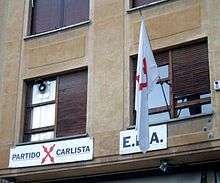Carlist Party of Euskalherria
Carlist Party of Euskalherria Partido Carlista de Euskalherria - Euskalherriko Karlista Alderdia | |
|---|---|
 | |
| Leader | José María Porro Sáinz |
| Secretary-General | Feliciano Vélez |
| Founded | 1974 |
| Headquarters | Calle Pozoblanco, 15-Bis, 1º Pamplona |
| Newspaper | Montejurra |
| Youth wing | Juventudes Carlistas |
| Union affiliation | Unión Sindical Obrera |
| Ideology |
Carlism Fueros Self-management socialism Confederalism Basque federalism Christian left |
| Political position | Left |
| National affiliation | Carlist Party of Spain |
| Website | |
| www.eka-partidocarlista.com | |

Carlist Party of Euskalherria (before 2000 Carlist Party of Euskadi (Basque: Euskalherriko Karlista Alderdia and Spanish: Partido Carlista de Euskalherria; EKA) is a left-wing carlist Basque political party, with presence in the Spanish Basque Country. The party was historically part of the pro-Carlos Hugo wing of the carlist movement. The party wasn't legalized until late 1977.
Organization and ideology
EKA defines itself as a federation of the Carlist parties of each of the four Basque provinces (Nafarroa, Álava, Gipuzkoa and Bizkaia), each of them fully autonomous in their respective territories.
At the state level EKA is confederated with the Carlist Party of Spain (or "the Spains" according to the traditional terminology of the movement), one of the parties that claims to be the direct heir of the historic Carlist movement. The party has an official magazine, Montejurra, which it is also the name of the mountain where they celebrate their annual feast.
After the general assembly of October 2008, the party appointed José Maria Porro Saínz (exmilitant of the Grupos de Acción Carlista and one of the leaders of Unión Sindical Obrera in Navarre) as its secretary general and Feliciano Vélez (who after the municipal elections of 2007, was elected mayor of the Navarrese town of Puente la Reina in the lists of the Agrupación Electoral Puentesina) as organization secretary.
Ideologically, the party defends a model of socialism based in workers' self-management, inspired by Yugoslav socialism, and a federal Euskal Herria in a confederal Spain.[1]
History
EKA was one of the organizers of the 1976 Aberri Eguna, in collaboration with the various parties of the Basque independentist left (including ETA(m), ETA(pm), EHAS and LAIA) and the Spanish revolutionary left (MC, Liga Komunista Iraultzailea and ORT). In February 1977 the party participated in the creation of Euskal Erakunde Herritarra.
Initially the Frente Obrero was linked to the Workers' Commissions, but due to the influence of the Communist Party of Spain (PCE) in them, EKA eventually opted for the Union Sindical Obrera, with which it shared common aspirations regarding self-management socialism as its social project.
In April 1977 150 EKA members occupied the Diputación of Navarre in protest against the violation of human rights by the Spanish State.[2] The same year, the government denied the legalization of the party, that presented a list to the elections called Agrupación Montejurra.
The position of the party in the Constitutional referendum of 1978 generated an intense and complicated internal debate. Finally the party asked for an affirmative vote, but they lost a relevant number of members due to this decision.[3]
During the 1990s its Secretary General was the lawyer Jose Angel Navarro Pérez-Nievas. In 1996 the party published a pacifist manifest, calling for both the end of ETA and repression. In 1998 EKA signed the Pact of Estella.
Institutional presence
Until 1987 EKA had about ten councilors in the Town Councils of several medium-sized urban areas like Tolosa (Gipuzkoa) or Sangüesa (Navarre).[4] In smaller rural towns the party always supported or created diverse local platforms, like Agrupación Electoral Puentesina in Puente la Reina (Navarre). In the local elections of 2003 the following Navarrese carlists were elected as councilors: Gerardo Montoya (Noain), Feliciano Vélez and Aurelio Laita (Puente La Reina – Gares), J. Joaquín Urra (Artajona - Artaxoa), Federico Salcedo (Andosilla), Cruz Barandalla and Roberto Beruete (Zirauki), and Carlos García (Tabar).
The only institutional representation the party ever got, other than local representatives, was a Navarrese MP (Mariano Zufía Urrizalqui) in 1979-1983.
References
- ↑ Izu Belloso, Miguel José (2001). Navarra como problema. Nación y nacionalismo en Navarra. Madrid: Biblioteca Nueva. p. 342.
- ↑ «Por la presencia de Suárez en la ONU. Los carlistas toman la Diputación navarra». Diario 16. 28 April 1977.
- ↑ «Partido Carlista de Euzkadi: "Todo lo que no sea el sí es irresponsable"». Hoja oficial del lunes: 4. 27 de noviembre de 1978.
- ↑ Elecciones Municipales en Euskadi y Navarra 1979-2015